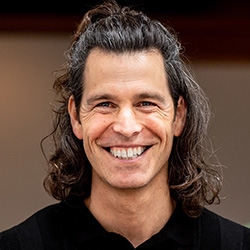
Search Results: guilt
-
Join CNVC Certified Trainer Arnina Kashtan as she examines the nature of guilt and how apologizing often fails to connect us to our needs.
-
The Compass – Arnina Kashtan's in-depth transformational process – is specifically designed to support you in reliably deepening your understanding of your own and others' conditioning, and finding ways to reclaim your full connection with yourself.
-
-
-
-
Tolerating reactivity, name-calling, blaming, guilt-tripping, or stonewalling can lead to resentment and hurt. Plus, the more you stay in a reactive dynamic, the more you are likely to reinforce the pattern. Setting life-serving boundaries around reactivity is about letting another know that you aren’t going to participate in that kinds of dynamics. This means knowing what helps with handling difficulties and asking for that.
-
Anger, guilt, shame, and shutdown are often based on reactivity and “should” thinking. They narrow and distort perceptions, which can bring more suffering. So instead, feel them without resistance, nor acting on them. Bring clarity by naming your observables and thoughts, plus your underlying vulnerable feelings, needs and self-responsibility. Then mourn what needs were, or are, unmet. Only then choose what actions to meet needs.
-
When someone behaves in a way that you may label convincing, cajoling, guilt-tripping, threatening, analyzing, or criticizing, you may be tempted to guess they have a "need" for control. Instead, name what this person is doing that isn't meeting your needs. If it is a true need your heart will have softened. If you feel resentment or resistance, you are likely making a judgment rather than guessing what they are needing.
-
Pay attention to when you're motivated by guilt, duty, obligation, shame, and worry. How do you feel? Does it bring up resentment, rebellion, submission, reactivity or resistance? When you're motivated by joy notice how that feels, and how others respond. Read on for a related story.
-
Trainer Tip: If you are motivated by fear, guilt, blame or shame, your actions will usually be motivated by avoiding pain. The best way to experience permanent, lifelong change is to focus on how your life will improve when you make a change. Notice when you attempt to motivate yourself and others with guilt, blame, or shame today, and then look for motivations that enrich life instead.
-
During the holiday season we may find ourselves taking responsibility for other's feelings, which can lead to guilt, shame, depression, and resentment. These feelings are exacerbated by the habitual pattern we call the "Vortex of Submission" (being hooked by a sense of duty and obligation). Read on for ways to recognize and break the pattern.
-
Why is it so difficult to change our patterns even when we want to, even when we experience shame or despair about them? Arnina Kashtan offers some of the common pitfalls and concrete steps to overcome them in the future.
-
Reveal, own and share the inner chatter that plays over and over in your head, in between the words you speak aloud. Arnina Kashtan will help you discover, embrace and open up the places inside that you’ve hidden and judged.
-
Trainer Tip: Every time you criticize yourself, you cause yourself to feel shame and guilt, which promotes depression and stagnation. Instead, bringing in more self compassion can increase opportunities for change. Do this by acknowledging your needs (or values) that aren’t met by your actions. Read on for how to do this.
-
Trainer Tip: Today, when you tell yourself that you "have to" or "should" do something, notice what you feel and experience - is it a sense of duty, obligation, guilt, shame, overwhelm, constriction, heaviness? Then consider the underlying needs you are trying to meet with the activity. This can shift the purpose and intention with an energy that motivates our actions can bring empowerment and joy to our lives.
-
Whenever we make mistakes, we're often beating ourself up in a way that breeds guilt, fear and/or shame. Nonviolent Communication offers a model based in self-empathy that lets you reflect, process and move forward without the guilt, fear and shame.
-
- Welcome unpleasant feelings and meet their flow in and around the body
- Discover how you can enjoy Anger as a beautiful life force
- Realize insecurity and depression as a door to the core of your humanity
- Know how to use fear to firmly connect to your life and strength
-
Blame is the game that protects me from the understanding that the cause of all my emotional distress, fear, shame and guilt comes from the part of me I call "the inner voice." As long as I keep the big bony finger of blame pointed in your direction, I can remain unaware of the fact that it is what I am telling myself about your behavior that is stimulating my painful reactions.
-
The Compass – Arnina Kashtan's in-depth transformational process – is specifically designed to support you in reliably deepening your understanding of your own and others' conditioning, and finding ways to reclaim your full connection with yourself.
-
Working for racial justice is a shift in perspective—a shift in understanding and empathy that leads to a change in our actions: to listen instead of talk, to follow instead of lead, to yield rather than dominate. And to accept that I will continue to mess up. Part of working to undo racism is having the humility to know when our own understanding is limited. Read on for more this, and how it relates to meditation -- plus personal and collective liberation.


















